Politics
What is carbon capture, usage and storage? | Carbon capture and storage (CCS)
The UK, along with many governments around the world, is placing its faith in carbon capture and storage, the technology that can keep carbon dioxide emissions from entering the atmosphere.
The government has committed almost £22bn over 25 years to developing CCS in a big investment promise designed to reignite Britain’s struggling industrial heartlands.
But does CCS work, and how can the UK afford it?
What is carbon capture and storage (CCS)?
The key aim of CCS is to stop CO2 escaping into the atmosphere and exacerbating the climate crisis.
The components of CCS have been around for decades: they are a group of technologies that can capture the carbon dioxide produced by big factories and power plants, preventing them from reaching the atmosphere and contributing to global heating, then transport them, bury them or reuse them.
In most versions, the preliminary step involves fitting factory chimneys with solvent filters to trap carbon emissions. The gas can then be piped to locations where it can be used or stored.
Most carbon dioxide will be injected deep underground – where fossil fuel gas comes from in the first place – to be stored where it cannot contribute to the climate crisis. This can be part of a process called “enhanced oil recovery”, where CO2 is pumped into an oilfield to force out the remaining pockets of oil that would otherwise prove difficult to extract.
Some of the CO2 could be used to help make plastics, grow greenhouse plants or even purified to be used in carbonated fizzy drinks.
Does the UK need carbon capture?
CCS is considered an essential part of the UK government’s commitment to become a net zero economy by 2050.
These technologies feature in most policy paths towards this goal, including the map provided by the government’s official climate advisers at the Committee on Climate Change, who have said CCS is a “necessity, not an option” in the transition to net zero.
Globally, CCS projects could reduce global carbon dioxide emissions by almost a fifth and reduce the cost of tackling the climate crisis by 70%, according to the International Energy Agency (IEA).
One of the main reasons CCS is necessary is because heavy industry – fertiliser producers, steel mills and cement makers – would be difficult and expensive to adapt to run on cleaner energy. UK government officials believe that using CCS is the lowest-cost option to meet its climate targets.
Why is CCS controversial?
Some climate experts and green groups believe the technology could keep big economies hooked on fossil fuels.
They say that when CCS is used to remove the carbon produced by gas power plants or to remove the carbon from gas to create clean-burning “blue hydrogen”, it creates an expensive route for fossil gas to remain part of the energy system. This matters, because carbon is also released when gas is extracted from the ground and transported.
Many of the companies investing in carbon capture development are oil and gas firms – they stand to benefit from government support for CCS and from the continued use of their gas.
after newsletter promotion
Green groups believe investment should instead focus on clean forms of energy such as “green hydrogen”, which is extracted from water using an electrolyser powered by renewable electricity. CCS should be used only as a last resort for industries that offer an important economic contribution and that would be too difficult to decarbonise.
Where is CCS technology being used?
There are several CCS projects operating commercially, but nowhere near enough to clean up the world’s carbon emissions.
The forerunners are in the US, Canada, Norway (which aims to be an international leader in the field) and China. In Abu Dhabi, the energy company Adnoc has begun a drilling campaign at Fujairah for a project to turn captured carbon dioxide into rock.
Globally, about 51 megatons of carbon dioxide were captured and stored last year, according to BloombergNEF data, or about 0.14% of global emissions.
The IEA has said: “CCS deployment has been behind expectations in the past, but momentum has grown substantially in recent years, with approximately 300 projects in various stages of development across the CCS value chain.”
Is the process expensive?
The cost of carbon capture technologies is “high and varied”, according to the International Institute for Sustainable Development, but costs are expected to fall as more countries invest in CCS.
UK government officials believe CCS is cheaper than trying to cut emissions from very high polluting sectors through alternatives such electrification, or importing goods rather than manufacturing them domestically.
Some people have argued that governments could reduce the cost of CCS on taxpayers by compelling oil companies to pay for enough carbon capture to offset their own emissions. One study argues that the companies that profit from extracting fossil fuels should be paying for an equivalent quantity of carbon dioxide to be stored geologically as a condition of operating.
Under a “carbon take-back obligation”, all fossil fuels extracted or imported into a country or group of countries would be offset by storing underground an equivalent amount of carbon dioxide to that generated. Over time, it could be used to store 100% of emissions by 2050 to help the world reach net zero.
In reality, this plan is unlikely to go ahead. Instead, governments are crossing their fingers that the costs will come down as the technology evolves.
Politics
Why are we building homes when so many are standing empty?

 Getty Images
Getty ImagesIn an average working day, Claudia Bowring has to play the role of detective, estate agent, family mediator and, occasionally, grief counsellor.
She’s an empty homes officer for a borough council in the suburbs of Nottingham.
There are just short of 700,000 empty and unfurnished homes in England, according to the most recent government figures. Of those, 261,471 are classed as “long-term empty,” meaning no-one has lived there for six months or more.
If all empty homes were brought back into use, the housing crisis would be solved at a stroke and, arguably, the government would not have to build 1.5m new homes.
Unfortunately, it’s not as simple as that. Bringing derelict and abandoned properties back to life can be a long and complex process.
Even finding out who owns properties that have been standing empty for years, or in some cases decades, can be a challenge.
Ms Bowring regularly uses a genealogist to track down the owners of long-abandoned houses on her patch in Rushcliffe.
They are not always happy to be reminded of their responsibilities.
“In some cases, people don’t really understand the seriousness of their property being empty,” she says.
“They think ‘well, it’s my house, there is nothing the council can say or do to make me change my mind.’”
Often homes become empty when the owners pass away, leading to a long administrative process known as probate, when their assets are divided up.
Once that has been settled, families can still be reluctant to part with a property. Claudia Bowring is facing this problem with one of the houses on her patch.
“The children have grown up there, their mum’s died and left them the house, and emotionally they feel quite attached to the property, and me suggesting they should get rid of it or have it for rental is quite difficult to hear.
“They don’t want to see someone else living in the property. They’ve got trees that they planted in the garden when they were children, and they don’t want someone coming in and ripping those up.”
When persuasion fails, the gloves come off.
Like many local authorities, Conservative-controlled Rushcliffe charges extra council tax on homes that have been unoccupied for more than a year, under the Empty Homes Premium brought in by the previous government.
If that doesn’t do the trick, the council can take enforcement action.
It treats abandoned properties as an environmental health issue – derelict properties can be a magnet for vandalism and vermin, harming the quality of life for people living next to them.
In some cases, the council is able to carry out emergency repair work on abandoned homes, and then force a sale at auction to recover its costs. This sometimes results in a windfall for the owners who were so reluctant to sell up in the first place.
Another tool at the council’s disposal are Empty Dwelling Management Orders, which give councils the right to take over and make repairs to run-down private properties that have been vacant for at least two years. They can rent the property out for up to seven years to recover costs.
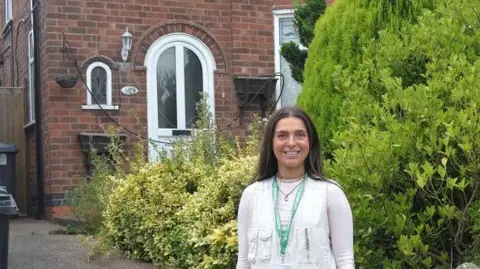
Rushcliffe has used these tools and others to bring a modest but steady flow of properties back into use since it started taking the issue seriously in 2019.
But it does not have to do this. There is no legal requirement for local authorities to bring empty homes back into use – and some councils choose not to.
Rushcliffe is motivated by a desire to improve the quality of life for its residents and ease the housing shortage.
But unlike many councils around the country, it is not in financial trouble – and does not have a serious homelessness problem.
For some hard-pressed authorities “empty homes work is a luxury,” says housing expert Adam Cliff.
“It is not against the law to own an empty property,” he adds, and “different councils have different priorities”.
As secretary of professional support group the Empty Homes Network, he wants to raise the profile of empty homes among the public and politicians, as an alternative to building on the green belt land.
He argues that there needs to be a central government programme, with a “pot of money for councils to dip into as and when they need money to carry out enforcement,” along the lines of a scheme operated by the Welsh government.
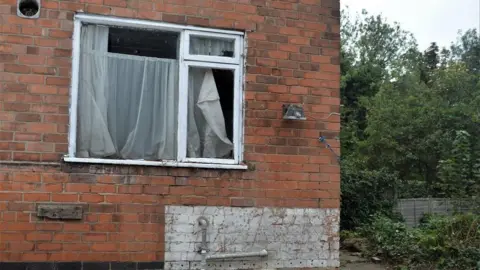
Probate law needs to be reformed to prevent properties “sitting empty in perpetuity,” he adds, but above all he believes empty homes need to be put back in the spotlight as a national issue.
Campaign group Shelter is also concerned about the growing number of privately-owned empty properties, even if its main focus is on getting more social-rented homes built.
Chief executive Polly Neate said: “We desperately need more genuinely affordable social homes and if the government is serious about its commitment to deliver them, it must do more to bring long-term empty homes back into use.
“Converting empty homes is not the silver bullet to ending the housing emergency, but it offers a cost-effective and green way to get more social rent homes built.”
Last year, Shelter produced a 10-city plan to rapidly convert 10,500 empty homes in the first three years of a new government.
But the issue was rarely mentioned during the general election campaign, with only the Green Party putting it in their manifesto.
And so far, there are few signs the Labour government regards it as a priority.
A Ministry of Housing, Communities and Local Government spokesperson said: “Councils have a range of tools at their disposal to bring empty homes back into use, including charging additional council tax on vacant properties.
“We are committed to building 1.5 million homes and delivering the biggest increase in social and affordable housing in a generation. This will unlock thousands of homes and make the dream of homeownership a reality for more people across the country.”
People working with empty homes all seem to have a strong sense of vocation.
Adam Cliff said he first got interested in the issue as a teenager, and wrote his university dissertation on it. Claudia Bowring talks about the satisfaction she gets from putting life back into “dead properties”.
But with little apparent interest from central government, and council budgets being squeezed, they are unlikely to be joined by new colleagues in the field any time soon.
Politics
Michael Gove says personal attacks on ex-wife Sarah Vine hurt most in his career

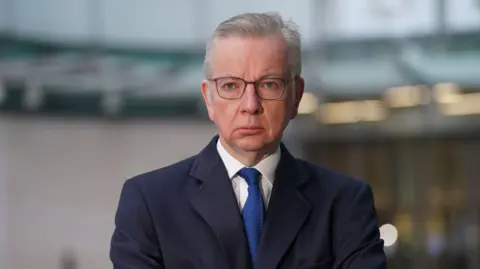 PA
PAFormer Conservative cabinet minister Michael Gove has said critics’ attacks of his ex-wife Sarah Vine was “the thing that really hurt most” during his political career.
Gove said Vine was “portrayed as a sort of Lady Macbeth figure” as he weighed up backing Boris Johnson for Tory leader, following the Brexit vote in 2016.
He said the “fact she was attacked in that way at a time of turmoil overall was incredibly hurtful”.
Gove – who stood down as an MP ahead of June’s general election – opens up about his most difficult moments in politics on his new BBC Radio 4 series.
In Surviving Politics with Michael Gove, the former education secretary speaks candidly with politicians from different parties about the strengths and skills needed in tough times.
For one episode, Gove interviewed Labour spin doctor and former cabinet minister Peter Mandelson.
Now editor of the Spectator magazine, Gove asked Mandelson what advice he would give new Labour MPs who have entered Parliament following this year’s general election.
“Be very clear what you believe in, what your convictions are, what your project is and what you want to achieve,” Mandelson said.
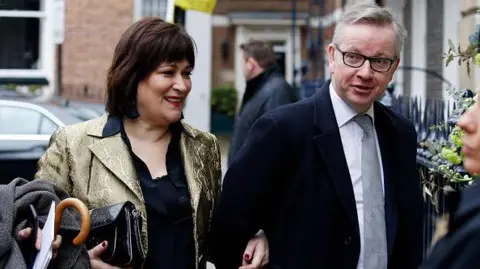 Getty Images
Getty ImagesHe then asked Gove: “All sorts of things have happened to you in the course of your political career. If you had to identify one really personal thing that hurt, what was that?”
Gove recalled how in 2016, Vine accidentally sent a private email – meant to be read by him and his close advisors – to a member of the public, who leaked it to the press.
In the email, Vine had advised her husband to get assurances from Johnson “otherwise you cannot guarantee your support” for his leadership bid.
Two days later, Johnson unexpectedly withdrew, after Gove made a surprise attempt to become leader of the Conservative Party.
Gove said his ex-wife, “whom I still love very much”, was “a strong woman” and disputed the comparison to Lady Macbeth.
Gove said: “It’s always fine if you’re being attacked on ground where you think, yeah, I’m happy to defend myself.
“But when it’s a misunderstanding and a misunderstanding that affects someone close to you, that’s particularly difficult.”
He added: “It’s when people seek to construct a narrative and they draw someone else in and that person is collateral damage in an attack on you. It hurts so much.”
Mandelson said he saw “an echo of that in my own life, with my own partner, now husband, when they went for him and they did”.
In the interview, Mandelson said: “I didn’t even think I could necessarily enter Parliament because I was gay.”
He said he lived openly with his partner and was told by people “you’re going to find it very difficult to be selected.
“And it was a struggle and in the 1987 election, which was the first campaign I directed, I was targeted viciously by the News of the World,” he said.
Mandelson talked about internal Labour divisions and the power struggle between Gordon Brown and Tony Blair as they vied for leadership of the party in the 1990s.
In a conversation about “change-makers” in the current Labour government, Mandelson described Health Secretary Wes Streeting as “courageous”.
Mandelson said: “Courageous and foolhardy? Let’s see I don’t see any point in being in politics unless you’re going to be a minister like that.”
He said “if there are others like Wes Streeting, then I’ll certainly be supporting them”.
You can listen to all episodes of Surviving Politics with Michael Gove from Monday 21 October 2024 on BBC Sounds.
Politics
Robert Jenrick’s leadership bid: Local Tories reacts

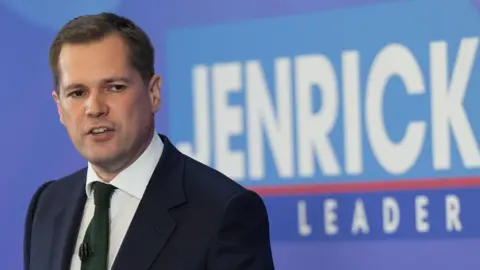 PA Media
PA MediaThe MP for Newark has made it through to the final two of the Conservative leadership contest along with Essex MP Kemi Badenoch – but do the locals think Robert Jenrick is the right person for the job?
“We need to get it right this time”, Conservative activist Jenni Oliver tells me, as she takes a sip from her cappuccino.
Tory members like Ms Oliver have grown accustomed to choosing prime ministers, but now they’re selecting the leader of the opposition.
“We voted Liz Truss in. That was a big mistake as far as I was concerned. Boris Johnson? No.”
“For me, that’s where the Conservatives lost it.”
The activists I am meeting for a coffee in the Nottinghamshire market town of Newark have real skin in the game this time.
Unsurprisingly, members of Jenrick’s local Conservative association all believe he is the best person to revive the party’s fortunes.
Tony Roberts, the president of the association, argues that the former cabinet minister has “really matured” as a politician.
Seen initially as an ally of David Cameron on the more “moderate” wing of the party when he became an MP in 2014, Jenrick has shifted to the right after quitting as immigration minster last year.
They accept that while his views might have changed over the years, his Conservative “values” are the same.
Tories here have fond memories of knocking on doors for Jenrick when he was first elected in a by-election a decade ago.
Sue Saddington, a local councillor, recalls having his campaign team over to her house for shepherd’s pie.
Now she is salivating again at the prospect of him becoming leader.
The local area “will really wake up to the fact that they have somebody of stature now in Newark,” she said.
“I think Newark will absolutely rejoice to it.”
It is a bold claim in a seat where more than 60% of voters backed other candidates in the July general election.
Jenrick’s majority was slashed from 22,000 to 3,500, with both Labour and Reform UK making huge gains at the election
He is now the only Conservative MP anywhere in Nottinghamshire or neighbouring Derbyshire.
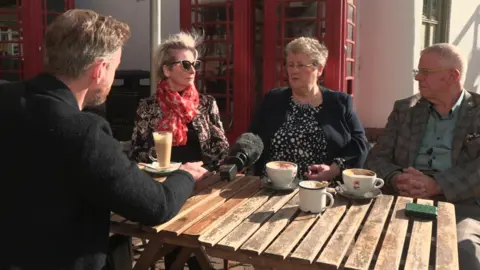
That result is described as a mere “blip” by Mr Roberts.
His more immediate concern is the limited options given to members in the leadership election.
“We’ve got just two, right-wing candidates and I would have liked the membership to have a wider choice,” he said.
“That’s why going down to two was a mistake, it should have been at least three.”
The timetable of the election race is also mistake.
Unless a candidate drops out, the result will be announced after the Budget – meaning Rishi Sunak, not his successor, will respond to Chancellor Rachel Reeves.
And what of the bookies’ favourite to be next Tory leader, Kemi Badenoch?
Both Ms Saddington and and Mr Toberts stress the importance of the party uniting behind whoever wins.
But Ms Oliver is not convinced.
“Personally, I think it’ll be a few months – it could be another Liz Truss,” she said.
Politics
Challenged on death of Dawn Sturgess, Russian ambassador dismisses inquiry

 BBC
BBCThe family of Dawn Sturgess, who died six years ago after coming into contact with Novichok, have been calling on Vladimir Putin to speak to the inquiry after her death in the Salisbury poisonings.
I put their request directly to Andrei Kelin, the Russian ambassador to the UK, in as part of a wide-ranging sit-down interview that will be broadcast on Sunday.
“I hardly believe President Putin will go to Britain just to testify something,” he said.
The UK government holds Russia, and two Russian agents, known as Alexander Petrov and Ruslan Boshirov, responsible for the attack.
Andrei Kelin questioned the need for an inquiry. “Why drag this history so long?”
He also rejected suggestions Petrov or Borishov should attend, saying the men had already given answers on TV – referring to a 2018 interview they gave on Russian state TV in which they claimed they had just been visiting Salisbury Cathedral.
That claim was mocked by some in Russia. UK officials called the interview “risible”.
Challenged with the fact that the UK, US, France, Germany, Canada all believe the attack was carried out by Russia with Novichok manufactured in Russia, Kelin said that “too many governments” were involved and dismissed their allegation as “nonsense“.
Pressed to give a response to the Sturgess family, the ambassador appeared to laugh, saying: “I have never met this family … If someone has died, of course we are concerned about that.”
On Ukraine, Kelin accused the UK of “waging war” on Russia by supporting the country with weapons and resources. If Zelensky “won’t negotiate with us, fine”, he said. “He will lose more and more terrain.”
This week, the Ukrainian president published a so-called victory plan to try to bring the conflict to an end next year.
It includes a formal request to join Nato and the lifting of bans on long-range strikes with Western-supplied weapons deep into Russia.
Challenged on Russia’s illegal invasion and stalemate in the war, the ambassador said Zelensky “does not want peace … he continues to ask for more and more; Nato, EU assistance, defence packages.
“Anything, but nothing about negotiations at all.”
Kyiv, backed by its allies, has always rejected any suggestions of negotiation after the Russian invasion. They believe that would mean the permanent loss of Ukrainian territory.
Western governments believe that Putin is under rising pressure at home, with increasing casualties and the huge cost of the war. Even Moscow’s finance ministry has acknowledged the intense strain on the economy.
But Kelin claims Russia is living “absolutely normal life”.
Asked if the suffering on both sides kept him awake at night, he said: “No one likes the war.” He said it could stop if the West stopped supplying arms to Ukraine.
“We are not just going to say, OK, [from] tomorrow we do not shoot each other. We won’t.”
On Friday, Keir Starmer reiterated his support for Ukraine. “We have always said that it is for the Ukrainian people to decide their own future so we’re clear, together with President Zelensky, that the only acceptable outcome is a sovereign Ukraine and a just peace.”
He also said Russia was getting weaker, with the war soaking up 40% of its budget, and the government believing there were more than 600,000 dead or wounded Russians, and another 500,000 casualties predicted by the end of the year.
With reports in recent days that North Korean troops are backing the Kremlin in the conflict, Kelin was challenged on Russia’s reliance on pariah states like North Korea and Iran.
“For us, it’s normal people, we have been friends, and we have a lot of common interests with North Korea and Iran … Anything bad – we do not see it.”
And on the American election, with just weeks to go, the ambassador claimed the winner didn’t make a difference at all. He said there was a “two-party consensus” on Russia – “and this is anti-Russian sentiment”.
The ambassador said that Russia had changed its nuclear doctrine in response to conversations among Western allies about allowing Ukraine to use long-range missiles supplied by them to fire into Russia.
Russia now says it would consider an attack from a non-nuclear state that’s backed by a nuclear-armed one to be a “joint attack”. That has been construed as a threat to use nuclear weapons in Ukraine.
Jens Stoltenberg, the former Nato boss, said the West had “called Putin’s bluff” over nuclear threats – implying it had crossed many of Putin’s red lines without anything happening.
Kelin said Stoltenberg’s statement itself was “a bluff” – adding Russia would protect itself “with all the means that are in our disposal, and believe me, there are lots of them.”
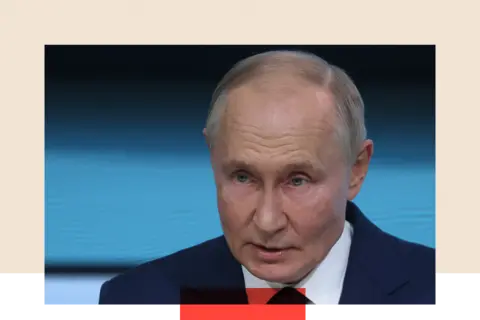 Getty Images
Getty ImagesIt is hard to overstate the impact of the Salisbury attacks on the fraught relationship between the UK and Russia.
A senior figure involved in the UK government response told me it was a “huge tipping point.
“It was shocking in the fact that the Russians were trying to kill people on our soil, but also, so blatantly happy for us to know that it was them,” they said, pointing to the use of Novichok, known to be manufactured and used by the Russian state.
Only a year before, then-Foreign Secretary Boris Johnson had gone to Moscow in the hope of a “reset” of the relationship between the two countries.
But another senior source told me: “we simply couldn’t have a normal relationship with them again with that in the background”.
They described the poisonings as worse than anything that had happened in the Cold War. “The competition was pretty brutal then, but this kind of thing was completely unacceptable.”
More than 20 Western allies expelled diplomats and spies from their countries in response after a bout of frantic diplomacy by Theresa May’s government, including pushing former President Trump to act.
One figure recalls, “it was pretty hairy at the time, a lot of Europeans didn’t want to do it. Trump personally didn’t want to do it but was persuaded to do so”.
The UK insisted that the announcement of the expulsions from each country was made at exactly the same time, with only the UK aware of how many Russians each government planned to order to leave.
The fear in Downing Street was that Trump would not be willing to take drastic action if he had known the numbers each European country were planning to expel.
The UK government now believes that Russia is the number one threat to the UK’s security.
Labour said in the election: “the defence of the UK starts in Ukraine,” and ministers believe the same now they are in government.
The UK has been at the forefront of leading the Western backing of Ukraine since the invasion in 2022, and has sent billions of pounds worth of weapons and resources to support the effort.
It’s given staunch political backing to President Zelensky – but don’t expect a decision on his request to use Western long-range missiles for at least a few weeks.
There are concerns in government about Russia increasing its efforts at sabotage on UK soil, with the boss of MI5 warning this week Russia was more and more engaged in “arson, sabotage and more dangerous actions conducted with increasing recklessness”.
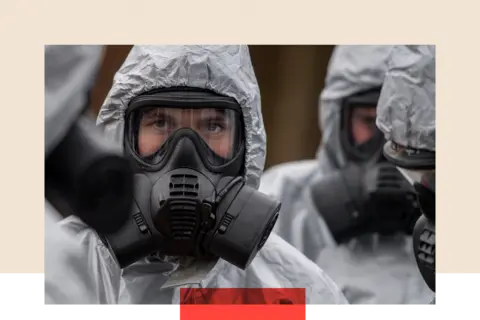 Getty Images
Getty ImagesBack in 2018, when the poisonings happened, the UK had no way of predicting how Russia’s aggression would grow into what one source calls an “off-the-charts bigger crisis” – with its illegal invasion of Ukraine.
But as the Salisbury inquiry delves into the impact of the poisoning on one innocent British family, its significance as a moment of the rupture in relations is clear too.
That’s caught in a conversation understood to have taken place between UK national security adviser Mark Sedwill and his Russian counterpart at the time, after Western allies had expelled 300 diplomats.
“You seem to want to take us back to the days of the Cold War,” the Russian said.
“Well, Yuri, at least we all knew the rules then,” Sedwill responded.
You can watch our interview with Russian ambassador Andrei Kelin tomorrow at 09:00 on Sunday with Laura Kuenssberg on BBC One. We’ll also talk to Health Secretary Wes Streeting.
Top photo credit: Getty Images


BBC InDepth is the new home on the website and app for the best analysis and expertise from our top journalists. Under a distinctive new brand, we’ll bring you fresh perspectives that challenge assumptions, and deep reporting on the biggest issues to help you make sense of a complex world. And we’ll be showcasing thought-provoking content from across BBC Sounds and iPlayer too. We’re starting small but thinking big, and we want to know what you think – you can send us your feedback by clicking on the button below.
Politics
Weight loss jabs for unemployed not dystopian, says Wes Streeting
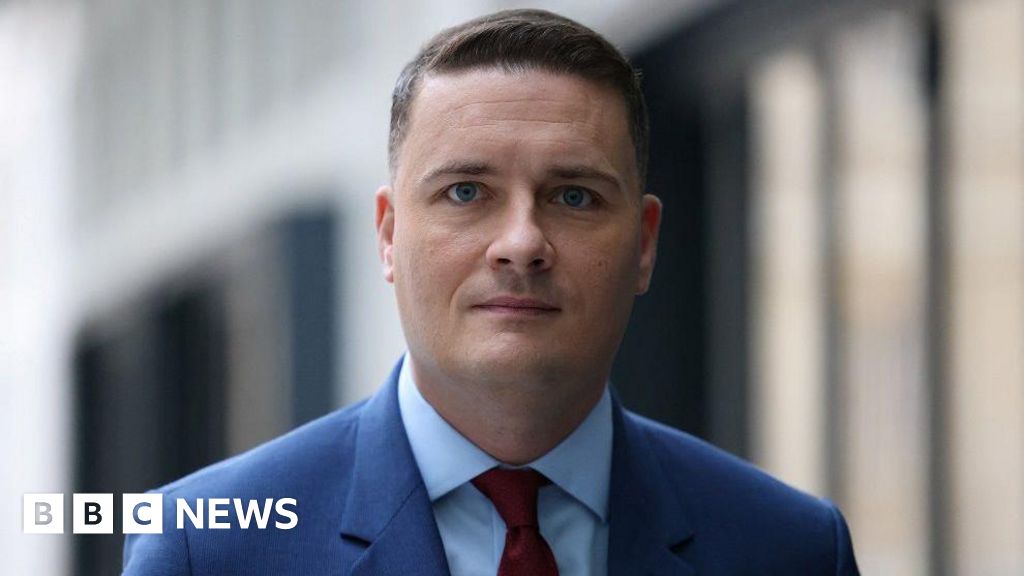
Health Secretary Wes Streeting has dismissed suggestions that plans to provide weight loss jabs to unemployed people with obesity are “dystopian.”.
The UK government is launching a five-year trial with pharmaceutical giant Lilly to test if the weight-loss drug Mounjaro can help get more people back to work and ease the strain on the NHS in England by preventing obesity-related diseases.
The announcement prompted a backlash, with accusations that the government was stigmatising unemployed individuals and reducing people to their economic value.
Speaking on Sunday with Laura Kuenssberg, Streeting said the jabs were part of a broader healthcare plan, adding that he was “not interested in some dystopian future where I involuntarily jab unemployed people who are overweight”.
“There’s a lot of evidence already that these jabs combined with changes to diet and exercise can help people to reduce their weight but also prevent cardiovascular disease and also diabetes which is game-changing,” Streeting said.
But he cautioned against creating a “dependency culture”.
Some injections are already prescribed on the NHS for the treatment of obesity, and also for people with diabetes.
Prime Minister Sir Keir Starmer previously told the BBC the jabs would be “very helpful” to people who want and need to lose weight.
“[The drug is] very important for our NHS, because, yes we need more money for the NHS, but we’ve also got to think differently”.
The NHS’s latest Health Survey for England shows in 2022, 29% of adults in England were obese and 64% were deemed to be overweight.
Illnesses relating to obesity cost the NHS £11bn a year, Streeting said.
Obesity has also been linked to the development of type 2 diabetes, with the NHS spending around £10bn a year – 9% of its budget – to care for people with diabetes.
Politics
Minister relinquishes Grenfell brief after survivors object
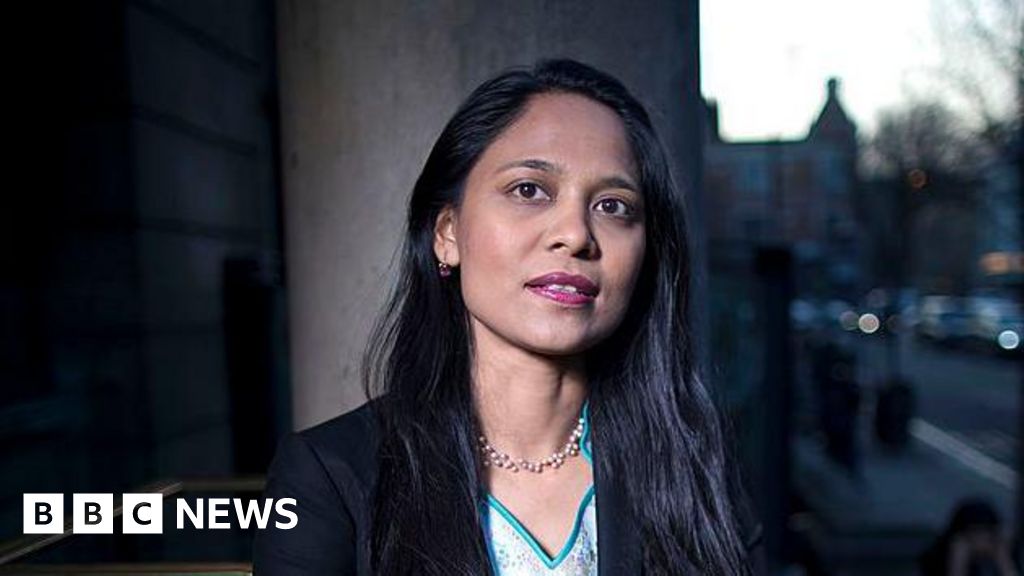
A Labour minister in the housing department has given up her duties managing building safety and the government’s response to the Grenfell Tower fire.
According to the Sunday Times, survivors of the tragedy had called for Rushanara Ali to stand down after the newspaper highlighted her attendance at the Franco-British Colloque, a conference that brings together senior politicians, civil servants and business leaders.
For many years, the conference has been co-chaired by Pierre-André de Chalendar, who until recently served as chairman of Saint-Gobain – the parent company of one of the firms heavily criticised in the recent Grenfell inquiry.
While the MP for Bethnal Green and Stepney is not resigning as a minister, she said she was relinquishing her building safety brief because “perception matters”.
The last meeting of the Colloque was held in January, several months before the general election.
Mr De Chalendar reportedly no longer serves as the co-chair of the conference.
The former head of Saint-Gobain was in charge of the company at the time of the Grenfell fire, when it was a majority shareholder of Celotex.
Celotex was one of the firms to manufacture the combustible insulation inside the cladding on Grenfell Tower.
The Grenfell Inquiry’s Phase 2 report heavily criticised Celotex for launching a “dishonest scheme to mislead its customers” over the suitability of its insulation for use on high-rise buildings.
According to the register of MPs’ interests, Ali was one of half a dozen MPs who attended this year’s Colloque in Paris in January.
Ali was re-elected to her east London seat in July, where she has been an MP since 2010.
In a statement, the Minister for Homelessness and rough sleeping said: “Trusted relationships between ministers and the Grenfell community are essential for this Department.
“Before I became a minister, I called for the French delegation of the Franco-British Colloque to cut ties with Saint Gobain. But I understand that perception matters and I have therefore concluded that the building safety portfolio would be best transferred to another minister.
“Our goals of making buildings safe and preventing another tragedy continue to be very important issues for me, and the deputy prime minister and the rest of the ministerial team have my full support in delivering on this work.”
-

 Science & Environment1 month ago
Science & Environment1 month agoHyperelastic gel is one of the stretchiest materials known to science
-

 Technology4 weeks ago
Technology4 weeks agoIs sharing your smartphone PIN part of a healthy relationship?
-

 Science & Environment1 month ago
Science & Environment1 month ago‘Running of the bulls’ festival crowds move like charged particles
-

 Science & Environment1 month ago
Science & Environment1 month agoHow to unsnarl a tangle of threads, according to physics
-

 Science & Environment1 month ago
Science & Environment1 month agoMaxwell’s demon charges quantum batteries inside of a quantum computer
-

 Technology1 month ago
Technology1 month agoWould-be reality TV contestants ‘not looking real’
-

 Science & Environment4 weeks ago
Science & Environment4 weeks agoX-rays reveal half-billion-year-old insect ancestor
-

 Science & Environment1 month ago
Science & Environment1 month agoSunlight-trapping device can generate temperatures over 1000°C
-

 Science & Environment1 month ago
Science & Environment1 month agoLiquid crystals could improve quantum communication devices
-

 Science & Environment1 month ago
Science & Environment1 month agoQuantum ‘supersolid’ matter stirred using magnets
-

 Womens Workouts4 weeks ago
Womens Workouts4 weeks ago3 Day Full Body Women’s Dumbbell Only Workout
-

 Science & Environment1 month ago
Science & Environment1 month agoWhy this is a golden age for life to thrive across the universe
-

 Science & Environment1 month ago
Science & Environment1 month agoQuantum forces used to automatically assemble tiny device
-

 Science & Environment1 month ago
Science & Environment1 month agoLaser helps turn an electron into a coil of mass and charge
-

 TV3 weeks ago
TV3 weeks agoসারাদেশে দিনব্যাপী বৃষ্টির পূর্বাভাস; সমুদ্রবন্দরে ৩ নম্বর সংকেত | Weather Today | Jamuna TV
-

 Science & Environment1 month ago
Science & Environment1 month agoNerve fibres in the brain could generate quantum entanglement
-

 Science & Environment1 month ago
Science & Environment1 month agoHow to wrap your mind around the real multiverse
-

 Science & Environment1 month ago
Science & Environment1 month agoA slight curve helps rocks make the biggest splash
-

 Technology3 weeks ago
Technology3 weeks agoUkraine is using AI to manage the removal of Russian landmines
-

 Science & Environment1 month ago
Science & Environment1 month agoA new kind of experiment at the Large Hadron Collider could unravel quantum reality
-

 Science & Environment1 month ago
Science & Environment1 month agoITER: Is the world’s biggest fusion experiment dead after new delay to 2035?
-

 News1 month ago
News1 month ago▶️ Hamas in the West Bank: Rising Support and Deadly Attacks You Might Not Know About
-
Business3 weeks ago
DoJ accuses Donald Trump of ‘private criminal effort’ to overturn 2020 election
-

 Business2 weeks ago
Business2 weeks agoWhen to tip and when not to tip
-
News1 month ago
the pick of new debut fiction
-

 Science & Environment1 month ago
Science & Environment1 month agoTime travel sci-fi novel is a rip-roaringly good thought experiment
-

 News1 month ago
News1 month ago▶️ Media Bias: How They Spin Attack on Hezbollah and Ignore the Reality
-

 Science & Environment1 month ago
Science & Environment1 month agoNuclear fusion experiment overcomes two key operating hurdles
-

 News4 weeks ago
News4 weeks agoOur millionaire neighbour blocks us from using public footpath & screams at us in street.. it’s like living in a WARZONE – WordupNews
-

 Technology4 weeks ago
Technology4 weeks agoWhy Machines Learn: A clever primer makes sense of what makes AI possible
-

 News2 weeks ago
News2 weeks agoNavigating the News Void: Opportunities for Revitalization
-

 Technology3 weeks ago
Technology3 weeks agoMicrophone made of atom-thick graphene could be used in smartphones
-

 MMA3 weeks ago
MMA3 weeks agoJulianna Peña trashes Raquel Pennington’s behavior as champ
-

 News2 weeks ago
News2 weeks agoMassive blasts in Beirut after renewed Israeli air strikes
-

 News2 weeks ago
News2 weeks ago▶ Hamas Spent $1B on Tunnels Instead of Investing in a Future for Gaza’s People
-

 Science & Environment1 month ago
Science & Environment1 month agoPhysicists have worked out how to melt any material
-

 Science & Environment1 month ago
Science & Environment1 month agoPhysicists are grappling with their own reproducibility crisis
-

 Sport3 weeks ago
Sport3 weeks agoWorld’s sexiest referee Claudia Romani shows off incredible figure in animal print bikini on South Beach
-

 Technology3 weeks ago
Technology3 weeks agoThis AI video generator can melt, crush, blow up, or turn anything into cake
-

 Technology2 weeks ago
Technology2 weeks agoSamsung Passkeys will work with Samsung’s smart home devices
-

 Football3 weeks ago
Football3 weeks agoRangers & Celtic ready for first SWPL derby showdown
-

 News2 weeks ago
News2 weeks agoHeavy strikes shake Beirut as Israel expands Lebanon campaign
-

 TV2 weeks ago
TV2 weeks agoLove Island star sparks feud rumours as one Islander is missing from glam girls’ night
-

 Sport2 weeks ago
Sport2 weeks agoCoco Gauff stages superb comeback to reach China Open final
-

 Sport2 weeks ago
Sport2 weeks agoWales fall to second loss of WXV against Italy
-

 Sport3 weeks ago
Sport3 weeks agoBoxing: World champion Nick Ball set for Liverpool homecoming against Ronny Rios
-

 MMA3 weeks ago
MMA3 weeks agoDana White’s Contender Series 74 recap, analysis, winner grades
-

 News3 weeks ago
News3 weeks agoHeartbreaking end to search as body of influencer, 27, found after yacht party shipwreck on ‘Devil’s Throat’ coastline
-

 MMA2 weeks ago
MMA2 weeks agoPereira vs. Rountree prediction: Champ chases legend status
-

 Sport3 weeks ago
Sport3 weeks agoSturm Graz: How Austrians ended Red Bull’s title dominance
-

 MMA2 weeks ago
MMA2 weeks ago‘Uncrowned queen’ Kayla Harrison tastes blood, wants UFC title run
-
Business3 weeks ago
Eurosceptic Andrej Babiš eyes return to power in Czech Republic
-

 News1 month ago
News1 month agoYou’re a Hypocrite, And So Am I
-

 Sport1 month ago
Sport1 month agoJoshua vs Dubois: Chris Eubank Jr says ‘AJ’ could beat Tyson Fury and any other heavyweight in the world
-

 Technology4 weeks ago
Technology4 weeks agoMeta has a major opportunity to win the AI hardware race
-

 TV3 weeks ago
TV3 weeks agoPhillip Schofield accidentally sets his camp on FIRE after using emergency radio to Channel 5 crew
-

 News2 weeks ago
News2 weeks agoGerman Car Company Declares Bankruptcy – 200 Employees Lose Their Jobs
-

 Technology2 weeks ago
Technology2 weeks agoTexas is suing TikTok for allegedly violating its new child privacy law
-

 TV2 weeks ago
TV2 weeks agoMaayavi (මායාවී) | Episode 23 | 02nd October 2024 | Sirasa TV
-

 Money2 weeks ago
Money2 weeks agoWhy thousands of pensioners WON’T see State Pension rise by full £460 next year
-

 MMA2 weeks ago
MMA2 weeks agoPereira vs. Rountree preview show live stream
-

 Technology3 weeks ago
Technology3 weeks agoAmazon’s Ring just doubled the price of its alarm monitoring service for grandfathered customers
-

 Technology3 weeks ago
Technology3 weeks agoMusk faces SEC questions over X takeover
-

 Technology2 weeks ago
Technology2 weeks agoPopular financial newsletter claims Roblox enables child sexual abuse
-

 News2 weeks ago
News2 weeks agoHull KR 10-8 Warrington Wolves – Robins reach first Super League Grand Final
-

 News2 weeks ago
News2 weeks agoFamily plans to honor hurricane victim using logs from fallen tree that killed him
-

 Technology2 weeks ago
Technology2 weeks agoA very underrated horror movie sequel is streaming on Max
-

 Science & Environment1 month ago
Science & Environment1 month agoRethinking space and time could let us do away with dark matter
-

 Science & Environment1 month ago
Science & Environment1 month agoCaroline Ellison aims to duck prison sentence for role in FTX collapse
-

 Science & Environment1 month ago
Science & Environment1 month agoA tale of two mysteries: ghostly neutrinos and the proton decay puzzle
-
News1 month ago
The Project Censored Newsletter – May 2024
-

 Technology3 weeks ago
Technology3 weeks agoQuantum computers may work better when they ignore causality
-

 Technology3 weeks ago
Technology3 weeks agoUniversity examiners fail to spot ChatGPT answers in real-world test
-

 Health & fitness1 month ago
Health & fitness1 month agoThe secret to a six pack – and how to keep your washboard abs in 2022
-

 News1 month ago
News1 month agoNew investigation ordered into ‘doorstep murder’ of Alistair Wilson
-

 Sport3 weeks ago
Sport3 weeks agoWatch UFC star deliver ‘one of the most brutal knockouts ever’ that left opponent laid spark out on the canvas
-

 Technology3 weeks ago
Technology3 weeks agoEpic Games CEO Tim Sweeney renews blast at ‘gatekeeper’ platform owners
-
Business3 weeks ago
Bank of England warns of ‘future stress’ from hedge fund bets against US Treasuries
-

 Business3 weeks ago
Business3 weeks agoChancellor Rachel Reeves says she needs to raise £20bn. How might she do it?
-

 MMA3 weeks ago
MMA3 weeks agoAlex Pereira faces ‘trap game’ vs. Khalil Rountree
-

 Football3 weeks ago
Football3 weeks agoSimo Valakari: New St Johnstone boss says Scotland special in his heart
-

 Technology2 weeks ago
Technology2 weeks agoApple iPhone 16 Plus vs Samsung Galaxy S24+
-

 News2 weeks ago
News2 weeks agoBalancing India and China Is the Challenge for Sri Lanka’s Dissanayake
-

 Technology2 weeks ago
Technology2 weeks agoThe best shows on Max (formerly HBO Max) right now
-

 Sport2 weeks ago
Sport2 weeks agoMan City ask for Premier League season to be DELAYED as Pep Guardiola escalates fixture pile-up row
-
Business3 weeks ago
Sterling slides after Bailey says BoE could be ‘a bit more aggressive’ on rates
-

 News2 weeks ago
News2 weeks agoHungry customer left gobsmacked as two blokes riding giant HORSES stroll into local chip shop
-

 Technology2 weeks ago
Technology2 weeks agoUlefone Armor Pad 4 Ultra is now available, at a discount
-
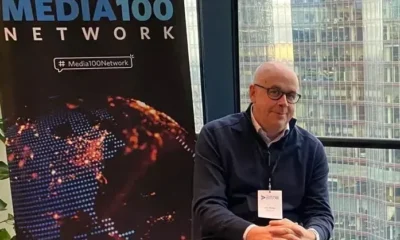
 News2 weeks ago
News2 weeks agoReach CEO Jim Mullen: If government advertises with us, we’ll employ more reporters
-

 News2 weeks ago
News2 weeks agoTrump’s Response To Melania’s Abortion Stance Has Critics Saying Same Damning Thing
-
Business2 weeks ago
Maurice Terzini’s insider guide to Sydney
-

 Money2 weeks ago
Money2 weeks agoWetherspoons issues update on closures – see the full list of five still at risk and 26 gone for good
-
Politics3 weeks ago
Rosie Duffield’s savage departure raises difficult questions for Keir Starmer. He’d be foolish to ignore them | Gaby Hinsliff
-
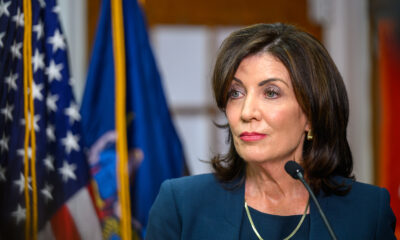
 Politics2 weeks ago
Politics2 weeks agoHochul’s careful conversations
-

 Football1 month ago
Football1 month agoMike Williamson: Carlisle United appoint MK Dons boss as head coach
-
Politics1 month ago
UK consumer confidence falls sharply amid fears of ‘painful’ budget | Economics
-

 Technology4 weeks ago
Technology4 weeks agoRobo-tuna reveals how foldable fins help the speedy fish manoeuvre
-

 Servers computers4 weeks ago
Servers computers4 weeks agoWhat are the benefits of Blade servers compared to rack servers?
-

 Technology3 weeks ago
Technology3 weeks agoArtificial flavours released by cooking aim to improve lab-grown meat
-
Business3 weeks ago
Should London’s tax exiles head for Spain, Italy . . . or Wales?


You must be logged in to post a comment Login